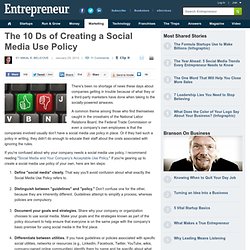

8 Tips for Training Social Media Marketers. Does your business have a plan for bringing on social media marketers?

Are you wondering how to work with experts outside the company while maintaining a consistent brand experience? Before you jump in headfirst or turn over the social media reins , . #1: Create a Social Style Guide Agreeing on a style for outward-facing content helps solidify your company’s identity and character, and is the starting point of good social media employee training, because it puts all agents on the same page. Perhaps the biggest hurdle in creating a style guide is to . If you’re working business to business in, say, the medical field, you’ll likely want to employ a professional voice.
. #2: Define Social Goals When creating your style guide, keep your goals in mind. Do you want to get users talking? Do you want their feedback so you can build a better product? Do you want them to advertise your brand for you by sharing your content? Once you . #3: Set Parameters and Grant Freedom. 10 Tips for Creating a Social Media Policy for Your Business. Policy.

It can be a dirty word, especially in social media communities. Why? Poorly written social media policies restrict, deter and deaden social media engagement–the exact opposite of what businesses want. However, great social media policies support, protect and empower high-quality engagement. It is about empowerment and trust. As Beth Kanter writes, “Trust is cheaper than control.” How to Craft a Privacy Policy for Your Website. Does your website have a privacy policy?

This article will tell you what you need to know to create a privacy policy for your website. Why a Privacy Policy? As online professionals and entrepreneurs, you know that collecting information on visitors to your (or your client’s) website can help tailor goods and services. It offers insight that previously could only be gathered through expensive research. Today, though, data collection can be easy and inexpensive. But with this type of information, businesses face a daunting task of protecting the data and telling visitors and/or consumers what will be done with the information. Example of a well-placed privacy policy and descriptive link. Interestingly, except for regulated industries, there is no federal law requiring an online business to have a privacy policy. In addition, following the policy set forth is imperative so there is no risk of sanctions. The Elephant in the Room Sometimes young companies learn the hard way.
Conclusion. The 10 Ds of Creating a Social Media Use Policy. There's been no shortage of news these days about companies getting in trouble because of what they or a third-party marketers have done when taking to the socially-powered airwaves.

A common theme among those who find themselves caught in the crosshairs of the National Labor Relations Board, the Federal Trade Commission or even a company's own employees is that the companies involved usually don't have a social media use policy in place. Or if they had such a policy in writing, they didn't do enough to educate their staff about the costs associated with ignoring the rules. Online Database of Social Media Policies. Online Database of Social Media Policies. 10 Must-Haves for Your Social Media Policy. Sharlyn Lauby is the president of Internal Talent Management (ITM) which specializes in employee training and human resources consulting.

She authors a blog at hrbartender.com. A few weeks ago, I wrote that your organization should have a social media policy, and one of the things I heard among all the great comments was: "Okay, but what should it say? " There are generally two approaches to social media policy making. Some organizations handle social media in an evolutionary way. Chad Houghton, the director of e-media and business development at the Society for Human Resource Management, told me that he thinks, “it might be beneficial not to create some arbitrary rules without first seeing where the opportunities and risks really are.”
Other organizations, meanwhile, feel more comfortable establishing a clear policy from the outset. 1. All policies need to address what's in it for the reader/user — what should the reader take away after reading the policy? 2. 3. 4. 5.